
by Regan Bervar | Jul 23, 2021 | Main Articles
“Anybody who doesn’t know what soap tastes like never washed a dog.” Franklin P. Jones
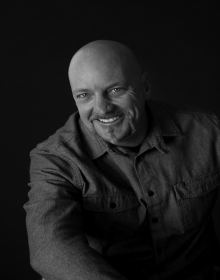 by Luke Schmaltz
by Luke Schmaltz
Dogs are best friends, counselors, consolers, and confidants — they can share your emotional highs and spiritual lows with equal enthusiasm. Perhaps the only thing they love as much as being with their humans is the chance to run and play with their fellow canines. Across the Mile High City, there are numerous places where dogs can go for a leash-free romp. Yet, as with the rest of Denver’s infrastructure, this aspect has been placed in lopsidedly-high demand by the population boom. A recent article on denverite .com cites an estimate that there are somewhere around 150,000 dogs in Denver across 99,000 households.
Dog parks tend to coincide with areas which are in some stage of the gentrification process. As with most other urban issues, dog parks are a divisive topic — with non-owners being unsympathetic to the tax burden and dog owners being unanimously for it. The result is a network of areas across the city which are specifically designated for communal, off-leash dog play. Additionally, many residents choose to run their dogs in any open area across the Denver Parks and Recreation system, which is for the most part a benign practice with a few legal caveats.
According to BringFido.com, “There are 46 off-leash dog parks within 20 miles of Glendale.” This guide will keep you relatively close to home, featuring outdoor dog-friendly destinations within several miles of the Glendale/Cherry Creek area.
Top Dog Parks Near Glendale And Cherry Creek

Playa Del Carmen Park: Perfect for locals who need a convenient place to let their dogs get some exercise without making a long trip to a larger, out-of-the-way destination.
Playa Del Carmen Park Dog Run
Named after Glendale’s sister city in Mexico, this park with a dog run is situated along Kentucky Ave. just west of E. Cherry Creek Drive. This place is perfect for locals who need a convenient place to let their dogs get some exercise without making a long trip to a larger, out-of-the-way destination.
Lowry Dog Park

The Lowry Dog Park: High energy, low energy and agility runs for a wide variety of dogs.
Located at Yosemite Way and E. 4th Place, the park is known for its “agility” section for young dogs who want to show off their physical prowess as well as its “high energy” and “low energy” zones for younger, older, smaller, and larger breeds, respectively. Owners are encouraged to bring their own water, especially on a hot day, and are reminded to also bring baggies for cleaning up after their four-legged friends.
Kennedy Dog Park
This park is located at 9700 E. Hampden Ave. and features off-street parking as well as high and low-energy dog runs in separate fenced areas. The ground in the play areas is dirt, making cleanup after your pets easy. Meanwhile, the regulars — human and canine — are known to be friendly and easy going. Visitors are advised to bring their own water and, as shade can be scarce, folks should bring sunscreen, an umbrella, or both.
Stapleton Dog Park
Located at 2002 Spruce St. just north of E. Montview Blvd., the designated area in this park is one expansive dirt field for dogs of all sizes and energy levels to roam, run, and play. There are some water fountains in various states of working order, so owners are advised to bring water and, as always, arrive prepared to clean up after your pets. In the play area, there is a posted (unenforced) rule of “no children under 12” most likely for liability reasons but the shade trees, benches and other park features offer plenty of options for those not in the fenced area.
Carla Madison Dog Park
Located off the corner of 16th and Josephine near the 2400 block of E. Colfax, this small but clean park adjacent to East High is perfect for city dogs who need a bit of open space to run and play. The parking lot and grounds are wheelchair accessible, and visitors must bring their own water and dog waste cleanup bags.
Grandview Dog Park
Located in Aurora, east of Glendale, and near Quincy Reservoir, this park at 17500 E. Quincy Ave. features ample parking and a massive five-acre play area designed exclusively for dogs. There is a bit of a hike involved between the parking lot and the park, so visitors should be prepared to keep dogs leashed until inside the fenced-off play area. There are separate large and small dog sections, with the former offering agility obstacles for high-energy breeds. As with most dog parks, owners should bring water for their pets and arrive prepared to clean up the inevitable evacuation piles.
Railyard Dog Park

The Railyard Dog Park: Popular, centrally located destination.
Located in lower downtown, this park is located at 19th and Bassett Streets and is perfect for folks who like to take their dogs for an afternoon drive. The grounds feature a soft, sandy surface rather than grass as well as separate high-energy and low-energy play areas. As with all dog parks, the BYO water and poop bags protocol applies here. Plus, the park at large offers beaches and shady areas for visitors.
Denver Leash Laws:
More Like Loose Guidelines
The law simply states that, in public areas, all dogs must be kept on a leash unless within confined, designated areas and must be under the supervision of a keeper or an owner who is at least 18 years old. This includes areas of public parks that are not penned-in dog runs. As you may have noticed, however, this rule is being largely dismissed by dog owners. This is because, like most local ordinances, leash laws are not being enforced.
The Denver library.municode.com website explains, “It shall be the duty of the chief of police, and all other police officers and all animal protection officers, to see that a dog found running at large is taken up and impounded in the Denver Animal Shelter, and such dog may be so taken up without the necessity of filing a complaint and shall be impounded and disposed of in accordance with provisions of article VII of this chapter.” Similarly, the Warshauer McLaughlin Law Group website (https://w-mlawgroup.com/) states: “Dogs are considered “running at large,” if they are not on the premise of the dog’s owner, not on leash, cord, or chain held by the owner or guardian. They are also considered running at large, if they are on the owner’s property, but the dog still has access to the ‘public right of way,’ such as sitting in the front yard unrestrained.”
Were this policy to be enforced to the letter, Denver officials would be working overtime to corral and impound all of the dogs running around off-leash in local parks and open-space areas. Similarly, the posted rules in most dog parks state that dogs within the facility must be registered, vaccinated, and spayed or neutered if they are over six months of age. This is not always the case, not by a long stretch, so dog park users are advised that other pet owners may not follow the rules. But — as far as the authorities and the average citizen are concerned — no one seems to give a woof.

by Regan Bervar | Jun 25, 2021 | Main Articles
“From funerals come flowers.” Ancient Proverb
 by Luke Schmaltz
by Luke Schmaltz
As Denver accounts for the fallout of the past year and pieces itself back together, some residents are reveling in a set of unforeseen outcomes. Prior to the pandemic, pot smokers could not get their weed delivered to their homes and drinkers could not take their alcoholic beverages with them from an establishment.
This is no longer the case. For the sedentary smoker and the ambulatory imbiber, there are new circumstances that can either enable your sanctuary or unleash your adventure — depending on your vice and/or what sort of a day you’re having. New bills affecting how marijuana and alcohol are sold and consumed have recently been approved with overwhelming support in a sweeping effort to bolster the economy.
Another 2020 Shocker

Now, weed smokers need only get up off the couch long enough to answer the door in order to legally replenish their supply.
In an unprecedented move, the Denver Department of Excises and Licenses submitted proposals which were actually designed to create commerce rather than hinder it. Anyone who has dealt with this hissing bureaucracy of red tape and miscommunication knows this is not normally the case. Typically, anyone looking to obtain a business and/or liquor license, noise permit, food retail license, or any of the other 73 licenses the office issues knows this can be a daunting task involving circus levels of hoop jumping and presidential degrees of lip service. The proposals cruised through City Council uncontested and passed through the legislative process unanimously. In a recent Westword article, Marijuana Industry Group director Truman Bradley is quoted as saying, “You know cannabis has arrived when marijuana bills pass through Denver City Council with literally no comment. That never would have happened in the old days.”
Wait, What?
In another surprisingly progressive development, the bills contain social equity provisions regarding new marijuana business licenses. The law now states that all new licenses granted between now and 2027 (except testing laboratory licenses) are required to be given to individuals who have been previously convicted of or at least arrested for a drug offense or have endured civil asset forfeiture because of a drug offense. Qualifications also extend to family members of those who have suffered from the above circumstances and those who reside in an area of high crime or low economic opportunity. This is great news for the little people who want a taste of Denver’s near one billion dollar a year cannabis industry. Whether granting marijuana business licenses to folks with the aforementioned qualifications is a great idea remains to be seen.
Make That To Go, Please

It is widely agreed by hospitality professionals that making takeout sales of alcohol legal saved many establishments in 2020/21.
Meanwhile, House Bill 21-1027 recently passed through the house and Senate chambers and is headed to Governor Polis’ desk to be signed into law. The law allows restaurants and bars to sell alcoholic beverages, to go, between the hours of 7 a.m. and midnight. This extends the currently similar circumstances already in place by another four years until July 1, 2025. Per transaction, bars and restaurants can now sell takeout orders of either two 750 mL bottles of wine, one liter of distilled spirits or one 12-pack of beer.
As most folks already know, last year Polis signed a bill into law once in March and again in July allowing businesses to sell alcohol via delivery and to go as a way of creating revenue during the pandemic. This maneuver allowed many businesses that would have otherwise had to close forever to make it through the pandemic.
Recently, in support of this bill, the Colorado Restaurant Association released a statement saying, “This legislation is critical to the recovery of Colorado restaurants, 93% of which have relied on alcohol to go to supplement lost revenue in the wake of the COVID-19 pandemic. In a poll conducted last year, 85% of Coloradans over the age of 21 years were in favor of this bill.” Association President and CEO Sonia Riggs also states, “Passing this measure is a political no-brainer. Being able to sell alcohol beverages for takeout and delivery has been a lifeline for the Colorado restaurant industry, which lost $3 billion in revenue in 2020 alone. Allowing alcohol to go can play a big role in alleviating the gravest economic crisis the restaurant industry has faced in living memory.”
Further, according to exact wording in the bill, the new law “allows cities to create outdoor communal dining areas where two or more restaurants are allowed to attach their liquor licenses and then sell and serve alcohol in that outdoor dining area.”
Way To Go, Dude
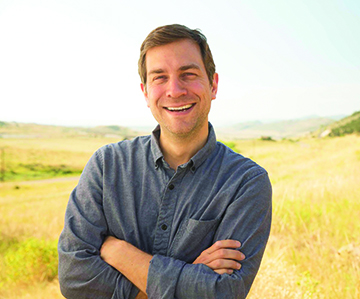
With a name like Jeff Bridges (in reference to the actor’s character in The Big Lebowski) it’s no wonder the Democratic Senator of the same name who first proposed this bill would be championing alcohol sales for folks too aloof to pour their own drinks. In a recent CBSN interview, Bridges explains that since lawmakers shut down bars and restaurants during the pandemic because they felt they had to save lives, it is now only fair that they do something to help businesses recover. “We shut them down and we did that to keep people safe. We had to do it. It was the right thing to do,” Bridges says. “But because we did that to these bars and restaurants, I think we have an obligation to do whatever we can to help them come out the other end.”
In an era where many politicians don’t seem to give a rip about the little guy, at least there are some who still seem to care. At a time when any piece of good news is cause for celebration — anyone working in hospitality can definitely say “cheers” to that.
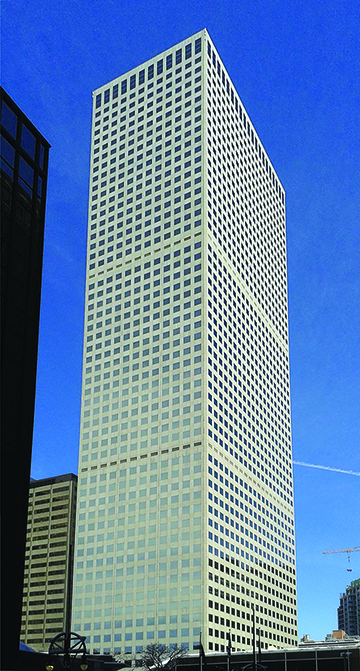
by Regan Bervar | May 26, 2021 | Glendale City News
 by Luke Schmaltz
by Luke Schmaltz
In the past year, the Denver commercial property market has been flipped upside down, run through the wringer, and hung out to dry. While circumstances appear bleak in some areas, the twists and turns of pandemic-induced social upheaval are not without glimmers of hope and outright indications of future solvency.
Commercial and residential real estate are symbiotic halves of a larger whole, and just as one directly affects the other, the balance between the two can take on surprising configurations. Such is the current state of affairs in the Mile-High City, and property professionals from both sides of the fence are forging forth with equal amounts of bullish determination, speculative flexibility and hopeful trepidation.

Downtown offices may not quickly repopulate, as many work-from-home folks have relocated to the suburbs.
Parallel Perceptions
From the viewpoint of residential real estate professionals, the commercial market is a cliffhanger, a head-scratcher, and an anomaly compelling enough to draw curiosity that is far beyond casual observation. Jennifer Barnes of eXp Realty, LLC has considerable experience in the residential sector, and has watched with piqued interest as her area of the market reacts to the changing commercial sector. This area of the market is inevitably affected by the overnight replacement of traditional office settings with entire industries of remote workers. “The draw to being in the city is gone,” she begins. “There has been a huge run [on residential properties] across the whole Front Range — especially places like Conifer, Evergreen, and Elizabeth,” she explains. “The whole downtown Denver market is not what it was — people are not clamoring to be down there right now because they are working remotely. I mean, why would you want to live in a congested area if you don’t have to?” Barnes was fortunate enough to be on the upside of the remote worker trend, unlike other large real estate firms with huge offices and sizable leases to boot. Her firm, eXp, grew during the pandemic due to low overhead while others were forced to downsize because “they didn’t have the revenue from home sales because they were shut down during Covid, but they still had huge office building leases to pay.”
Meanwhile, from a real estate inspector’s viewpoint, the commercial property shift has created circumstances reminiscent of the pre-marijuana retail boom. Robert Crawford is owner/operator of Colorado Complete Home Inspections, and he points out, “Before we had the cannabis industry, we actually had a lot of empty warehouses and empty retail spaces. Then, something came along which allowed new investors to buy up the available spaces at a fraction of the price. The vacuum left behind by the Covid reminds me of that. The landscape now versus back then bears a striking similarity,” Crawford explains. “You’re seeing ‘for sale’ and ‘for lease’ signs on retail spaces in some districts and among commercial warehouses alike.” So, it seems the stage is once again set to favor a buyer’s market. Perhaps this indicates that once again, another influx of outside investment capital and enterprise is already underway.
A Dual Perspective

Shane Henry of 303 Property is amazed at how many cash-solvent investors are standing by to scoop up retail spaces.
Shane Henry, owner of 303 Property, has been working as a broker in the Denver commercial and residential markets for eight years. “When Covid hit, I thought commercial real estate was going to totally take a dive, but it didn’t,’’ he begins. “There’s still a lot of people out there with money, so as soon as a retail space becomes available, someone else is waiting to swoop in and scoop it up. So, it’s really interesting because I thought for sure it was going to be the opposite. It blows my mind, to be honest.” Henry continues, “A lot of people are showing up from other states like California with a lot of money from having just sold property there. So, they can come in and pay cash for spaces in Colorado.” Case in point: strip malls. Henry explains the robust state of occupancy in most of these retail destinations, “I’m not seeing lots of vacancies in them. If anything, I’m seeing almost more of a demand for these spaces.”
Letters From The Front
Meanwhile, a cross-section of those working exclusively in the trenches of Denver commercial real estate reveals a wide variety of viewpoints.
-

Vincent Grandi with Keller Williams Realty Urban Elite thinks vacant commercial properties offer some obvious social solutions.
Vincent Grandi of Keller Williams Realty Urban Elite contends that the work-from-home directive has gained momentum that may not be totally reversed. He sees the vacancies in the office building sector of the commercial market as an opening to address the 500 lb. elephant in the proverbial room. “This could be an opportunity to address the homeless crisis with a windfall of micro-type condos” he explains. While this is merely speculation and not a hard-and-fast solution, Grandi is also quick to point out the consequences of office buildings and warehouse properties which remain empty for too long. “Leaving all that property vacant is just presenting opportunities for things that aren’t good such as graffiti, arson, vandalism, and theft.”
- Mark Ryan, a broker with eXp Commercial Real Estate, lays it out plain and simple with the office building situation. “The biggest eye opener for me was how people working from home had such an effect on property values. Commercial property shifted from a landlord’s market to a tenant’s market overnight,” he begins. “What I’m seeing is a whole lot of properties coming on as ‘reduced rate’ listings.” While this is the case with office buildings due to the rigid nature of their intended use, it may not apply to other commercial properties. “Retail is different, because it can be sliced up in so many different ways,” Ryan explains.
-

Michael Griffin of Madison Commercial Properties feels that office building occupancy will return as a fiscal necessity.
Michael Griffin is a Managing Partner at Madison Commercial Properties in Cherry Creek, and he sees the effect of the work-from-home contingency on office space as a temporary circumstance that will correct itself. “Over time,” he attests, “people will be getting back to work [in offices]. Yes, Covid affected office space, for sure, but the last six weeks have been really busy,” he explains. “For some industries, office dynamics and corporate culture rely heavily on in-person workplace environments. As a business owner, I know for a fact that it is crucial to directing, motivating and communicating with your staff.”
- Yvette Kimmel is a broker with Ai3 Properties, which handles a network of 10 office buildings in Southeast Denver. She paints an upbeat picture of the commercial real estate market, at least as far as her properties are concerned. “We have every reason to be encouraged” she begins. “We have been extremely busy, and the only thing that is different in our business is that our tenants are just kind of moving around. In some cases, it is to smaller suites … but for the most part, we are staying very full,” she explains. “I think we are in an enviable position because we are not in prime downtown real estate, and we are not in prime DTC real estate — we’re right between those, so we’ve got people moving out of those expensive suites into something that is still in a prime location without those high prices per square foot,” she continues. Kimmel is confident that office culture is an integral part of American work life, saying, “Part of the experience is the social experience.” Kimmel also contends that, as society opens back up, in-person retail may also be in for a much-needed surge. “We don’t all want to be buying from Amazon for the rest of our lives,” she says.
-

Rachel Colorosa of Colorosa Commercial Properties takes a data-driven approach to her informed speculations.
Rachel Colorosa, Executive Director of Colorosa Commercial Properties, is a self- professed “statistics geek” and a graduate of Colorado College with a B.A. in International Political Economics. When analyzing the effect of Covid-19, the work-from-home contingency and the stark vacancies in large commercial office buildings — she dug into the numbers. She cites a series of recent surveys by Gensler — a global (50 locations worldwide) architecture, design, and planning firm focused on data-driven insights. “The data shows that, because of Covid and social distancing, people don’t like confined spaces — especially elevators,” she begins. “This means large downtown office buildings may not recover, but suburban office facilities under four stories will be at capacity.” Colorosa sees the current trends in retail, office, and industrial real estate as three intersecting lines which form an “x” with a horizontal line through it. “There’s a negative trend in retail, office is flatlining, and industrial is going way, way up,” she explains. Based on the Gensler data, Colorosa feels “we’ll see a lot of retail turned into offices” and “empty big box retail spaces will be repurposed as call centers or Amazon fulfillment centers.”
Currently, diagnosing the status of commercial real estate in Denver is speculative, and relies heavily on the informed perception of the beholder. At least one thing is clear — things are happening — which is a welcome change from last year’s grim alternative.

by Regan Bervar | May 26, 2021 | Main Articles
 by Luke Schmaltz
by Luke Schmaltz
While the era of the combustion engine is decelerating and low-mileage, high-maintenance vehicles are simply impractical for daily use, there’s no denying the appeal of perhaps the greatest aesthetic achievement of the 20th Century, hot rods.
Of the myriad gatherings and outdoor events that were sorely missed by some folks last year, among them was the all-American, time-honored car show.
Saturday, June 12
Parker Car Fest 2021

Parker Car Fest benefits the Parker Task Force Food Bank.
Not to be confused with “Parker Days,” this annual event is hosted by the Parker Cruisers, an association of car lovers totaling over 900 show-worthy autos. Festivities will last from 8 a.m. until 2 p.m. with registration closing by June 10. The grounds for this show are set for 30 vendors and 200+ cars, trucks and motorcycles. Tickets can be pre-purchased at parkercruisers.com and all proceeds will go to the Parker Task Force Food Bank. Downtown Parker, CO, East Main Street.
Sunday, June 13, 2021
Fourth Annual Down To Earth Days
This comprehensive lifestyle spectacle is held with the goal of “improving the car scene and bringing our large gear-head family together.” The event boasts exhibitions by world-class Formula D drifters on a professional drift course, complete with ride-alongs for adventuresome guests. Similar attractions include a live burnout exhibition, two-step competition, live DJ, interactive vendor booths, food trucks, giveaways and trophies in 15 different automotive classes. This family-friendly event runs from 11 a.m. until 4 p.m. and kids under 12 get in free. Organizers present the occasion with a family feel, announcing that it is “about making the car culture a family again. Respect each other and respect the culture! We love this culture, and we do this for the culture.” 9755 Henderson Rd. Brighton, CO 80601.
Saturday, June 19
Colorado Camaro Club
37th Annual Chevy Show ‘N Shine Classic Car Show
A time-tested “classic” of a car show, this regional favorite co-sponsored by Century Chevrolet kicks off at 9 a.m. and goes until 2 p.m. Entries are just $25 and are limited to “F” body style or “Chevy powered.” Trophies will be awarded to some participants and all entrants are served lunch on the house. This slice of early summer fun will be set to the live sounds DJ Maverick Mike and held at 6105 W. 120th, Broomfield, CO 80020.
Sunday, June 27
Shotgun Willie’s Annual Car Show — Shotgun Willie’s Gentleman’s Club

Shotgun Willie’s is known for visual spectacles, and sometimes for car shows.
Nothing says “It’s summertime in Glendale” like muscle cars and scantily-clad women. The world-famous show club ushers in the warm months with a midday event which runs from 10 a.m. until 2 p.m. The premises will feature $2 Montucky Cold Snacks, $5 Hornitos, $5 Jim Beam and great BBQ all day long — plus — a tiki party in the T-Bar all day as well as the mesmerizing charms of the entertainment staff. The car show is free to enter, there are prizes for top contestants and one lucky whip will receive the coveted People’s Choice Trophy. 490 S. Colorado Blvd. Glendale, CO 80246.
Sunday, July 4
’Bout Time Pub & Grub Car & Bike Show

Car Shows Inc. produces and promotes several car shows across the Front Range every year.
Produced and promoted by Car Shows, Inc. (CSI), this event welcomes two- and four-wheeled participants with a “classic” look. Pre-registration is encouraged, and the event goes from 10 a.m. until 2 p.m. and will feature music by Van Jeffries Mobile Rock & Roll, awards, and dash plaques. 3580 South Platte River Dr., Drive A, Sheridan, CO 80110
Sunday, July 11
Back Street Tavern & Grill —
“Annual Mid-Summer Hot Rod Stomp” Cruise-in And Car Show
This will be the “Lucky 7th” installment of an area favorite featuring covered outdoor seating, a live DJ spinning old-school tunes, food, drinks, and super-prize giveaways. Event begins at 10 a.m. and runs until 1 p.m. at 1150 S. Galena St., Aurora, CO 80247.
Sunday, July 18
Hero’s Car Show — Hero’s Pizzeria and Tavern

Hero’s loves car shows so much, they plan to host a total of five throughout the warm months.
This will be the third of a total of five such events taking place at this regional favorite for pizza and Italian food. Early arrivals can start their automotive adventure off with a breakfast burrito “grilled up al fresco” while rockin’ to the tunes of Cruisin’ Dave. Visitors and hot rod aficionados can expect “vintage iron on four wheels and two along with many fun people.” 16070 E. Dartmouth Avenue (between Chambers and Buckley). Subsequent events in this series will be hosted on August 22 and September 12.
Saturday, July 24
Take Jake Car Show
Held at legendary Denver music venue The Grizzly Rose, this yearly event raises awareness and funds for organ tissue donation. This year’s contributions will be dedicated to veterans in need as well as the organization’s scholarship at Metro State. The show welcomes classic muscle cars, all-out custom cars, and rat rods, 4×4 trucks, pickups, street rods, imports, and motorcycles. Food and drinks will be available for guests along with silent auctions and sanctioned races. 5450 North, S. Valley Hwy., Denver, CO 80216.
Saturday, August 7
Rocky Mountain Car Show, Swap Meet

The Rocky Mountain Car Show, Swap Meet plans to have 400+ hot rods on display.
Another outdoor event produced and promoted by Car Shows Inc., this shindig will feature up to 400 classic car and hot rod participants — the combined treasures of Colorado Mopar Club, Buick Club, and CSI. The event is co-sponsored by the Collector Car Council of Colorado and will also feature War Bird flybys and a swap meet where gearheads and collectors can buy and sell automotive parts, accessories and collectibles en masse. Festivities go from 8 a.m. until 2 p.m. and are held at the Rocky Mountain Metropolitan Airport, 11755 Airport Way, Broomfield, CO 80021.
Saturday, August 21
Holy Rollers Charity Car Show
This is the fourth installment of an annual charity event which benefits the Society of St. Vincent de Paul — an organization dedicated to helping families in crisis in North Metro Denver. The event runs from 9 a.m. until 2 p.m. and is held on the grass in S. Midway Park in Broomfield. Over 175 automobiles are expected to participate, and festivities will include door prizes every 30 minutes and awards for the top 30 entrants. West Midway Blvd. & Kohl Street, Broomfield, CO 80020.
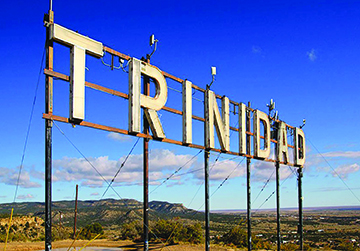
by Regan Bervar | Apr 23, 2021 | General Featured
“Rather than turning the page, it’s much easier to just throw the book away.” — Anthony Liccione
 by Luke Schmaltz
by Luke Schmaltz
Sometimes, the greener grass on the other side of the fence is attainable — as long as you’re willing to go 199 miles south (three hours and three minutes by car) to get there. Trinidad, Colorado, is a former mining town with three-or-so centuries of history, a patchwork topography of dilapidation and new development and a lot of potential.
As Denver’s metropolitan growing pains metastasize into cosmopolitan cancers, a few longtime advocates and sworn spouses of the Mile High City are doing the unthinkable — they are eyeing new climes in hopes for a fresh beginning. Once upon a not-too-distant past, Denver was the best kept secret of the Mountain West region. Soon, however, it became a blaring advertisement, then an oversaturated trend, and is now a hyper-capitalized, ultra-modern, less-remarkable version of its former self.
While recent transplants are none the wiser, longtime residents pine for the old times. The days of one-of-a-kind, mom-and-pop joints and relatively safe neighborhoods where you could find a spot to park your car in front of your affordably-priced place to live.
While Trinidad has been patiently waiting like a distressed maiden on the side of the freeway, its rescue had to occur in stronger gestures than just well-meaning sentiments. Those have finally arrived in the strongest form of statement possible: commerce. Movers and shakers not only from Denver but surrounding areas are pouring their assets and creative juices alike into redeveloping a once-thriving metropolis in the effort to contribute to a newly-emerging urban economy.
The Broadway Cabal
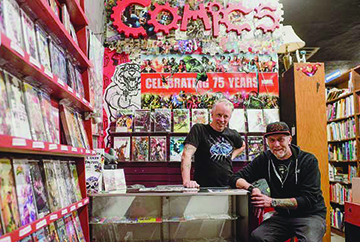
Jim Norris and Matt Meygasi of Mutiny Information Cafe are set to open a second location in Trinidad, Colorado.
Jim Norris and Matt Meygasi, co-owners of Mutiny Information Cafe, often look out of their shop’s front window across Broadway at their music venue neighbors, The Hi-Dive. The latter is owned by Curt Wallach and Suzanne Magnuson and has seen South Broadway fluctuate from a booming stretch of business development to its current state of shuttered, Covid-19-induced squalor. The latest commonality between the two teams is not that they share property in an embattled district of Denver, but that they are expanding operations into the untapped and exponentially promising town of Trinidad.
Norris and Meygasi will soon be opening a second location of the locally beloved and internationally infamous Mutiny Information Cafe. Meanwhile, Wallach and Magnuson will be opening a second bar/ music venue in the currently fallow Trinidad Lounge. Wallach and Magnuson have partnered with Denver trailblazer Kayvan Khalatbari as 50/50 owners of the bar and adjacent retail space. Mutiny Information Cafe will be their first tenants.
These migrating enterprises are a testament to the scrappy, independent, forward-thinking character of many Denver DIY businesses, which are disappearing at an alarming rate due to Covid-19 restrictions and the hyper-capitalization that is synonymous with gentrification. In addition to running unique businesses vital to the personality of South Broadway, the proprietors of Mutiny and Hi-Dive possess healthy doses of hope and the desire to work hard to create a better future.
Thus far, the town of Trinidad at large is welcoming new businesses with open arms. Mayor Phil Rico explains, “We are trying to improve our economy and become more diversified. People who want to move down here and open businesses — they are welcome to it. New businesses will boost our local economy and hopefully give residents who are already here some other options that may not be available right now.”
New Beginnings

Kayvan Khalatbari is a Denver business innovator who is expanding his progressive ideas to an untapped market.
Kayvan Khalatbari is a well-known Denver figure in many circles, primarily those of business, art and politics. The former mayoral candidate continues to blaze an entrepreneurial trail across the city, providing jobs, opportunities and outreach. His various ventures include (or have included) a beloved chain of dine-in/takeout joints known as Sexy Pizza, a cannabis dispensary, a consulting business, the widely-revered Sexpot Comedy collective, and more. After years of grassroots community building that was relentlessly countered by an unchecked, city-wide thirst for corporatization, Khalatbari’s gaze began to scan the landscape in search of more fertile grounds for his enterprises.
When asked about the primary drivers that swayed him to expand into Trinidad, Khalatbari explains, “I have trouble sleeping and breathing in Denver, the traffic, and frankly — the number and the type of people that have moved to Denver recently. It’s a lot of folks who seem really excited about the party aspect of Denver while not offering anything to the community, not offering back anything of substance.”
As a front-seat witness to gentrification, Khalatbari pulls no punches. “I’ve seen a lot of things I really enjoyed about Denver fall by the wayside [such as ] music venues, restaurants, and friends moving away. When I’m in Denver, even before the pandemic, I largely just stayed at home and had friends over. There’s nothing unique about it anymore. It’s pretty much in line with other major cities in terms of the types of places it has to hang out in and the types of people you’ll encounter. That’s what’s unique about Trinidad. I think, in a lot of ways, it’s more diverse than Denver.”
Khalatbari clarifies that he is in no way dismissing the city that has been so good to him and is quick to recognize Denver’s enduring merits. “I don’t want to make it sound like I despise Denver. I still love Denver; it has given me everything professionally that I could have ever asked for. I still live there most of the time, my girls still go to school there, I still have businesses there … but it’s just run its course and as I get older it makes sense for me to plant roots in a place that’s a little more long term, you know, for my mentality and my sanity.”
Moving forward, Khalatbari has purchased several properties in Trinidad that require varying degrees of remodeling, repair and TLC. Among these are The First Baptist Church, a large retail space in the downtown area, the Trinidad Lounge, an historic train depot, and a residential property. The local community is tight-knit and includes families and business interests that have been established in the area for generations.
Natural wariness of strangers aside, Khalatbari explains that the reception of himself and other outsiders looking to contribute to Trinidad’s development and revitalization has been overwhelmingly positive. “In the eight months I’ve been here, I’ve had conversations with probably half the city council, and I’ve met with tons of people across the city and for the most part everyone has been very supportive. I’ve been overwhelmed with the people in this town supporting wherever they can, wanting to collaborate, wanting to do good things, to feel the energy — it’s pretty palpable around here I’d say.”
Khalatbari underscores the importance of working with the Trinidad community and other outside investors so that, moving forward, the city as a whole can avoid becoming just another hyper-capitalized, unattainable swath of Colorado gentrification. “There’s a genuine fear of this becoming another inaccessible place in Colorado. One of the reasons I moved here is to see this town that has so much potential, but hasn’t had the investments, come to life while avoiding that sort of an outcome. I work a lot with worker cooperatives and employee-owned businesses. It is capitalism, sure, but it’s the shared economy capitalism. My pizzerias are employee-owned, and I would love to see that kind of model take hold in a place like this.
Wally’s World

Trinidad, Colorado is a city of 9,000 people, most of whom are ready to embrace redevelopment.
Wally Wallace is the Economic Development Director for the City of Trinidad. What the city planners may not have known when they hired him is that he’s also got a creative streak that makes him a seriously valuable asset to the city’s future. A comedian and a musician, among other pursuits, Wallace’s excitement about the city is infectious. He has a litany of proposed events queued up for consideration including Spaghetti and Western festival (an homage to the city’s Italian population), comedy events, themed bicycle rides and a weed-picking enthusiasts’ initiative to rid the town of goat heads.
He mentions Fisher’s Peak State Park — the recently-opened massive open space project that is now the second largest state park in Colorado. “They are projecting that this could potentially bring in up to $15 million into this community per year,” Wallace explains. “We are working on an interstate trail system where people will be able to hike and bike back and forth between Colorado and New Mexico.”
Wallace is responsible for introducing Khalatbari to Trinidad and explains how another Denver innovator — Dana Craw-ford — is making waves locally as well. Crawford is famous for the renowned and highly successful remodeling of Larimer Square and Union Station in Denver. She is currently spearheading the $18M remodel of the Fox Theater in Trinidad, which is a near-exact small-scale replica of NYC’s Carnegie Hall.
Send In The Skilled Tradespeople

The Downtown Trinidad Development Group welcomes Denver businesses and skilled tradespeople alike.
Meanwhile, across town, Karl Gabrielson, the director of the Downtown Trinidad Development Group is looking at the big picture. Similar to Mayor Rico, Khalatbari, and Wallace, he acknowledges the concern that updating the city might erase its small-town feel. “We are a long way from there,” he explains. “We are still in the early stages of redevelopment, but the conversation has begun.” He explains. “Trinidad has been boom and bust over and over again and we need to look at long-term sustainability — to develop a business environment that can level out those ups and downs.”
Between an investment group from NOLA planning to build a boutique hotel and Phil Long Ford Dealership owner Jay Cimino sinking millions into the revitalization effort, it has also become apparent that Trinidad needs housing and tradespeople in order to sustain the effort and provide for new arrivals. By and large, Gabrielson is optimistic, saying “Overall, it’s a great time to experience Trinidad. It’s been overlooked for a long, long time.”






















